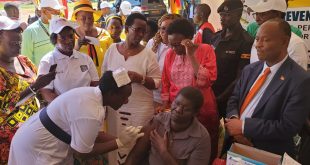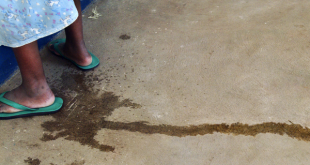
By Goodluck Musinguzi- Kampala
The Ministry of Health has received 1200 doses belonging to one of the three candidate vaccines against the Sudan Ebola Virus that will be used in a campaign dumbed Tokomeza Ebola Vaccine trial in Uganda. The Director General of the World Health Organization, Dr Tedros Adhanom Ghebreyesus thanked the partners for the swift collaboration.
“There was no vaccine 79 days ago when the outbreak began in Uganda. Dr Diana Atwine, Uganda’s Permanent Secretary at the Ministry of Health announced on 20th September 2022, the first death from a confirmed patient”.

At the 75th World Health Assembly, Dr Tedros was overwhelmingly voted
Dr Jane Ruth Aceng Congratulating Dr Tedros. Currently he is supporting Uganda fight Ebola
Dr Tedros said this is a historical milestone in the Global Capacity to respond to outbreaks. In 2015 as West Africa faced the deadly ebola that killed thousands, a similar Global effort took 7 months from the outbreak declaration to the arrival of vaccines and the start of the trial.
“Every time we work together to get evaluate vaccines quickly and integrate trials in the midst of outbreak response, we improve the global system. This has benefits now and into the future. These aren’t trial runs: these are optimizing the system for the next disease threat”, Dr Tedros said.
Hon Dr Jane Ruth Aceng, Minister of Health received the first batch of vaccines against the Sudan Ebola Virus on 8th December 2022 in the outskirts of Kampala City.

“This morning, we received 1200 doses of one of the 3 candidate vaccines against the Sudan Ebola Virus from the World Health Organization. This will be used in the Tokomeza Ebola Clinical Trial spearheaded by Professor Bruce Kirenga based at lung Institute of Makerere University”, said Dr Jane Ruth Aceng
She said Uganda encourages and supports scientists to continue research to support the provision of appropriate drugs and vaccines to prevent future disease outbreaks.

Three vaccines are recommended for trial by the World Health Organisation expert panel. The one that arrived in Uganda is the Sabin Institute’s ChAd3-SUDV which is manufactured by the Sabin Vaccine Insitute in the United States of America. The other two vaccines will be added to the trial as doses arrive. The Ebola Vaccine trial in Uganda is led by Makerere University and co-sponsored by the Ministry of Health and the World Health Organization.
Dr Matshidiso Moeti, World Health Organization(WHO) Regional Director for Africa said we worked together to design the trial protocol, ensure speedy regulatory and ethical processes, train research teams and install refrigerators to preserve the vaccines.

“After the arrival of the ebola candidate vaccine in Uganda today, Moeti Matshidiso said this is a promising step towards possible protection against the virus, with Africa researchers taking a leading role we must not lower our guard and we will remain in active response mode”.
There have been no new ebola cases reported in Uganda since 27th November 2022. The trial would recruit contacts of recently confirmed cases for participation in a ring vaccination trial.
The Ebola virus has killed 56 people since the outbreak of the Ebola-Sudan strain of the hemorrhagic virus was declared by Dr Diana Atwine, Permanent Secretary Ministry of Health in Kampala.
The trial vaccine for the Ebola-Sudan virus will be administered to those at greatest risk for example immediate contacts of a person diagnosed with Sudan Virus Disease(Ebola Sudan). The World Health Organization has recorded 142 confirmed cases and 56 death of Ebola in Uganda.
Charles Wakida, an employee of the National Medical Stores, opened one of the ultra-low temperature freezers holding one of the three candidates’ vaccines against the Sudan strain of the Ebola virus, in Entebbe Uganda.
The Newly opened National Medical Stores in Kajjasi, Wakiso district is prepared to receive two more vaccine candidates to Uganda by World Health Organization, the first jointly produced by the University of Oxford and Serum Institute of India, and the second by Merck & Co Inc.
There are currently no licensed vaccines for the Sudan strain of Ebola that is causing the deadly infection in Uganda and the trial is to determine whether any or all of the three are effective in combating the strain.
Hon Dr Jane Ruth Aceng, Minister of Health will announce the start of the trial date which is expected to be a game changer in the fight against the Ebola-Sudan virus. Ministry of Health workers have been anxious to receive the vaccines.
The Ministry of Health has recommended a number of measures including a lockdown for selected districts of Mubende and Kassanda so that they contain the spread of Ebola. The efforts have paid off as there are no more cases being reported.
About the vaccine and the vaccination strategy:
VSV-EBOV Vaccine was developed by the Public Health Agency of Canada. The vaccine was licensed to NewLink Genetics, and on November 24, 2014, NewLink Genetics and Merck announced their collaboration on the vaccine.
The concept of ring vaccination applied to the Guinea Ebola vaccine clinical trial is based on vaccinating the “rings” (group of contacts of a newly diagnosed Ebola “index case”) either immediately after confirmation of the Ebola diagnosis of the “index case”, or three weeks later (delayed vaccination). This strategy allows all the known contacts to be vaccinated within a short period of time, and it constitutes an excellent alternative to the use of a placebo. The ring vaccination trial design was developed by an international group of experts from Canada, France, Guinea, Norway, Switzerland, the United Kingdom, the United States, and the WHO. This group included Professor Donald A. Henderson, who led the WHO smallpox eradication effort.
The Guinea Ebola vaccine trial is a coordinated effort among numerous international partners. The trial is implemented under the responsibility of the Guinean government. The World Health Organization (WHO) is the sponsor of the study. The Government of Guinea, Doctors Without Borders / Medecins sans Frontières (MSF), Epicentre, the Norwegian Institute of Public Health and WHO are coordinating its implementation. The trial is funded by MSF; the Research Council of Norway through the Norwegian Institute of Public Health; the Canadian government through the Public Health Agency of Canada, Canadian Institutes of Health Research, International Development Research Centre and Department of Foreign Affairs, Trade and Development; and WHO, with support from the Wellcome Trust, United Kingdom.



